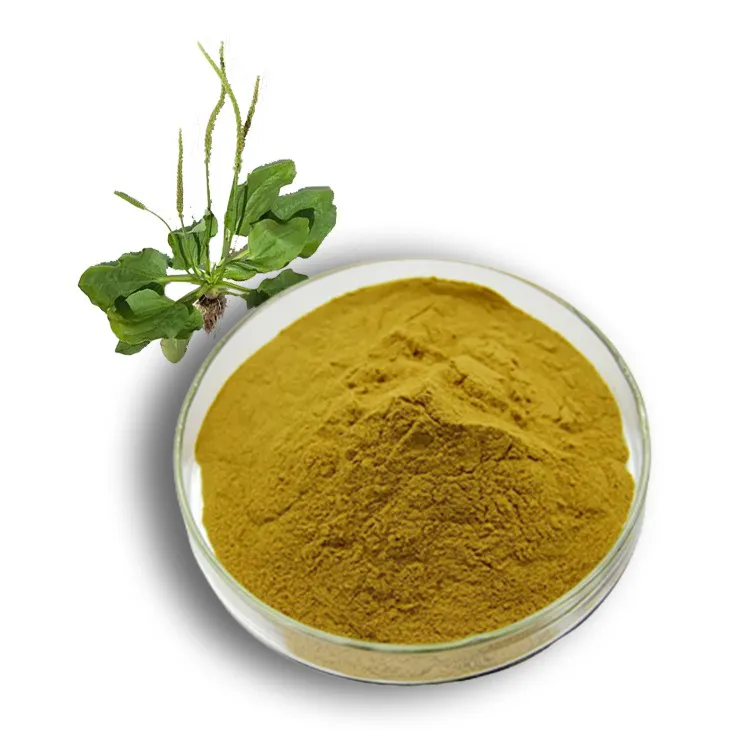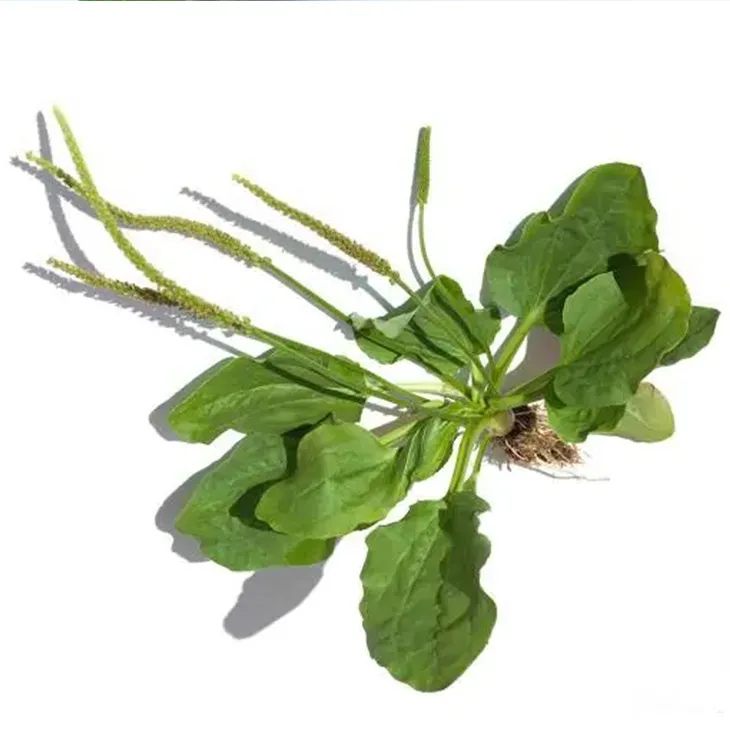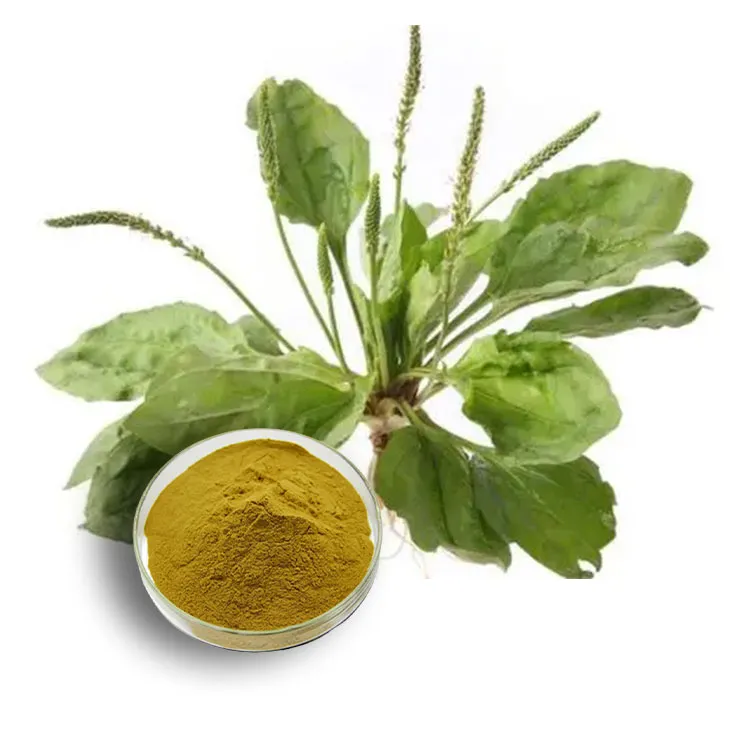- 0086-571-85302990
- sales@greenskybio.com
5 amazing things made from plantain extracts.
2024-11-13

Introduction
Plantain, a common plant found in many parts of the world, has been used for centuries in traditional medicine. However, in recent years, scientists have discovered that Plantain extracts have a wide range of applications far beyond its medicinal uses. This article will explore five amazing things made from Plantain extracts, highlighting their potential to revolutionize various industries.

1. Natural Wound - Healing Balms
Plantain extract has remarkable properties for wound healing. It contains bioactive compounds such as flavonoids, tannins, and alkaloids. These compounds work together to promote the healing process in several ways.
Anti - inflammatory Action
The flavonoids in plantain extract have strong anti - inflammatory properties. When applied to a wound, they reduce swelling and redness. For example, in a study comparing plantain - based balms to traditional antibiotic ointments, it was found that the plantain balm significantly reduced inflammation within the first 24 hours of application. This is crucial as excessive inflammation can delay the healing process.
Antimicrobial Activity
Tannins present in plantain extract act as natural antimicrobials. They can inhibit the growth of bacteria, fungi, and viruses. This helps to prevent wound infections, which are a major concern in the healing process. A laboratory experiment showed that plantain extract was effective against common wound - infecting bacteria such as Staphylococcus aureus and Escherichia coli.
Stimulating Cell Growth
Some of the alkaloids in plantain extract are believed to stimulate cell growth. This is essential for the regeneration of damaged tissue. In vivo studies on small animals have indicated that the use of plantain - based wound - healing balms can accelerate the formation of new skin cells, leading to faster wound closure.

2. Sustainable Bio - plastics
Plantain extract can be a key ingredient in the production of sustainable bio - plastics. As the world is increasingly concerned about environmental issues related to traditional plastics, bio - plastics offer a more eco - friendly alternative.
Raw Material Source
Plantain plants are abundant and can be easily cultivated. Their extracts can be used as a base material for bio - plastics. Compared to other sources of bio - plastics such as corn or soy, plantain has the advantage of being less resource - intensive in terms of land use and water consumption. For instance, in some regions where water is scarce, plantain can be grown with relatively low water requirements.
Biodegradability
Bio - plastics made from plantain extract are biodegradable. They break down much more easily in the environment compared to traditional plastics. This reduces the problem of plastic waste accumulation. In soil degradation tests, it was observed that plantain - based bio - plastics decomposed within a few months, while conventional plastics can take hundreds of years to degrade.
Mechanical Properties
Surprisingly, plantain - based bio - plastics can also possess good mechanical properties. They can be molded into various shapes and have sufficient strength for certain applications. Research has shown that by adjusting the composition of the plantain extract and the manufacturing process, bio - plastics with different levels of flexibility and toughness can be produced. For example, they can be used to make disposable cutlery or packaging materials.

3. Nutrient - Rich Fertilizers
Plantain extract can be transformed into nutrient - rich fertilizers. This is beneficial for sustainable agriculture and improving soil health.
Macro - and Micro - nutrients
Plantain contains a variety of macro - and micro - nutrients that are essential for plant growth. When the plantain extract is processed into a fertilizer, these nutrients are made available to plants. Macro - nutrients such as nitrogen, phosphorus, and potassium are present in significant amounts. Additionally, micro - nutrients like iron, zinc, and manganese are also found in plantain. For example, in a field trial, crops fertilized with plantain - based fertilizer showed improved growth compared to those without.
Organic Matter and Soil Structure
The use of plantain - based fertilizer also adds organic matter to the soil. This improves the soil structure, making it more porous and better able to retain water and nutrients. A healthy soil structure is crucial for root development and overall plant health. In a long - term soil study, it was found that continuous use of plantain - based fertilizer increased the soil's organic matter content and enhanced its water - holding capacity.
Beneficial Microorganisms
Plantain - based fertilizers can also promote the growth of beneficial microorganisms in the soil. These microorganisms play important roles in nutrient cycling and plant protection. For instance, certain bacteria and fungi can break down complex nutrients into forms that plants can easily absorb. Some can also produce substances that suppress plant diseases.
4. Novel Textile Dyes
Plantain extract can be used to create novel textile dyes. This offers an alternative to synthetic dyes, which often have environmental and health concerns.
Color Variety
Plantain extracts can produce a wide range of colors. Depending on the extraction method and the addition of other natural substances, different hues can be obtained. For example, a simple extraction process can yield a yellow - green color, while by modifying the extraction conditions and adding certain mordants, a deeper brown or even a purple - tinted color can be achieved. This provides designers and textile manufacturers with more options for creating unique and natural - looking fabrics.
Environmental Friendliness
Unlike synthetic dyes, which may contain harmful chemicals such as heavy metals and carcinogens, plantain - based dyes are environmentally friendly. They are biodegradable and do not pose a significant risk to water sources or the ecosystem. In dyeing processes, the waste water from plantain - dyeing is much less polluting compared to that from synthetic dyeing.
Compatibility with Textiles
Plantain - based dyes have good compatibility with various textiles. They can be used on natural fibers such as cotton, linen, and silk. The dyes adhere well to the fibers, resulting in long - lasting colors. Moreover, the dyeing process with plantain extract can often be carried out under milder conditions compared to synthetic dyes, which reduces the damage to the textile fibers.
5. Cosmetic Ingredients
Plantain extract has found its way into the cosmetic industry as well. It offers several benefits for skin and hair care products.
Skin - Soothing Properties
Due to its anti - inflammatory and antimicrobial properties, plantain extract is ideal for soothing irritated skin. It can be used in creams, lotions, and ointments for treating skin conditions such as eczema and psoriasis. In a clinical trial, a cream containing plantain extract was shown to reduce the itching and redness associated with eczema within a few days of use.
Hair - Nourishing Effects
Plantain extract can also be beneficial for hair. It contains nutrients that can nourish the hair follicles. For example, it may provide vitamins and minerals that are essential for healthy hair growth. Shampoos and conditioners containing plantain extract can help to improve the shine and strength of the hair. In a hair - growth study on volunteers, those using products with plantain extract showed a slight increase in hair thickness over a period of several months.
Natural and Safe
As a natural ingredient, plantain extract is considered safe for use in cosmetics. It is an alternative to synthetic chemicals that may have potential side effects. Consumers are increasingly interested in natural and organic cosmetics, and plantain - based products fit this trend.
Conclusion
Plantain extract has proven to be a versatile and valuable resource. From natural wound - healing balms to sustainable bio - plastics, nutrient - rich fertilizers, novel textile dyes, and cosmetic ingredients, its potential applications are vast. As research continues, it is likely that even more amazing uses for plantain extract will be discovered. This plant, which has been overlooked for so long, may hold the key to more sustainable and innovative solutions in various industries.
FAQ:
What are the main things made from plantain extracts?
The main things made from plantain extracts include natural wound - healing balms, sustainable bio - plastics, nutrient - rich fertilizers, and novel textile dyes.
How does plantain extract contribute to wound - healing balms?
Plantain extract contains certain properties and compounds that have anti - inflammatory and antibacterial effects. These properties can help reduce inflammation, prevent infection, and promote the healing process of wounds, making it a valuable ingredient in wound - healing balms.
What makes plantain - based bio - plastics sustainable?
Plantain - based bio - plastics are sustainable because plantain is a renewable resource. Unlike traditional plastics derived from fossil fuels, which are non - renewable and contribute to environmental pollution, bio - plastics made from plantain extract can be produced in an environmentally friendly way. Also, they may have better biodegradability, reducing waste accumulation.
Can plantain - extract fertilizers replace chemical fertilizers?
While plantain - extract fertilizers offer many benefits, they may not completely replace chemical fertilizers at present. Plantain - extract fertilizers are rich in nutrients, which can improve soil fertility and plant growth in a natural way. However, chemical fertilizers are often formulated to provide specific and high - concentration nutrients for large - scale agricultural production. In some cases, a combination of both may be the best approach to achieve optimal plant growth and soil health.
How are textile dyes made from plantain extracts?
The process of making textile dyes from plantain extracts involves extracting certain pigments or compounds from the plantain. These extracted substances are then processed and refined to be suitable for dyeing textiles. The exact method may vary depending on the type of plantain and the desired color and quality of the dye.
Related literature
- The Potential of Plantain Extracts in Modern Industries"
- "Plantain Extract: A Versatile Ingredient for Various Applications"
- "Exploring the Benefits of Plantain - Derived Products"
- ▶ Hesperidin
- ▶ Citrus Bioflavonoids
- ▶ Plant Extract
- ▶ lycopene
- ▶ Diosmin
- ▶ Grape seed extract
- ▶ Sea buckthorn Juice Powder
- ▶ Fruit Juice Powder
- ▶ Hops Extract
- ▶ Artichoke Extract
- ▶ Mushroom extract
- ▶ Astaxanthin
- ▶ Green Tea Extract
- ▶ Curcumin
- ▶ Horse Chestnut Extract
- ▶ Other Product
- ▶ Boswellia Serrata Extract
- ▶ Resveratrol
- ▶ Marigold Extract
- ▶ Grape Leaf Extract
- ▶ New Product
- ▶ Aminolevulinic acid
- ▶ Cranberry Extract
- ▶ Red Yeast Rice
- ▶ Red Wine Extract
-
American Ginseng Root Extract
2024-11-13
-
Baicalin
2024-11-13
-
Shikonin
2024-11-13
-
Europen Bilberry Extract
2024-11-13
-
Tongkat Ali Extract
2024-11-13
-
Aminolevulinic acid
2024-11-13
-
Sophora Japonica Flower Extract
2024-11-13
-
Hops Extract
2024-11-13
-
Plantain extract
2024-11-13
-
Pine bark Extract Powder
2024-11-13




















